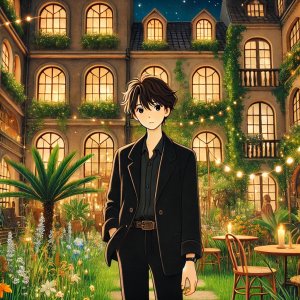This review may contain spoilers
What We Keep, Even When the Past Lets Go
I didn’t expect to be moved like this. Go Ahead holds a permanent place in my heart, and the idea of a remake — especially one condensed into 16 episodes — made me wary. It’s hard not to go in comparing every beat, bracing for what might get lost in translation. But Family by Choice didn’t try to copy the original’s soul. It found its own.
There’s something incredibly disarming about the way this version told its story — stripped down, yes, but still rich in emotional texture. The pacing was tighter, which meant some arcs didn’t get the space they might’ve deserved, but the heart? It never felt rushed. Every interaction between San-ha, Ju-won, and Hae-jun held weight. Nothing grand. Just steady, lived-in connection that grew deeper with each episode.
Hwang In-youp’s San-ha in particular stayed with me. His vulnerability wasn’t loud or dramatic — it was quiet, often unspoken, the kind that lingers behind the eyes and between words. He carried the burden of abandonment like someone used to holding back, not because he doesn’t feel, but because he never learned how to share the feeling. Watching him learn — slowly, haltingly — how to let others in, felt like watching healing in real time.
And that’s the thing — this version didn’t just explore pain. It understood what it means to carry it. To try and outrun it. To find people who sit beside it with you, without asking for it to be explained. That’s what hit hardest: not the grand reconciliations or sweeping emotional turns, but the small, often invisible acts of choosing each other. Again and again.
There were moments that felt compressed. Stories that could’ve unfolded with more breath. But even in its constraints, the show gave space for grace — for messiness, for forgiveness, for the quiet ache of growing up with emotional bruises you can’t name until someone else points to them gently and says, I see that too.
I’ll always love Go Ahead — that version was sprawling, slower, full of long silences and unresolved threads that mirrored real life. But Family by Choice brought something else: clarity. A sharper lens on the same emotional truths, reframed but no less powerful.
It reminded me that family isn’t defined by blood or even time. It’s shaped by presence. By choice. By the people who don’t flinch when things get hard, who stay when it would be easier to leave.
This story didn’t just echo the original — it stood beside it, shoulder to shoulder. And it earned its place.
There’s something incredibly disarming about the way this version told its story — stripped down, yes, but still rich in emotional texture. The pacing was tighter, which meant some arcs didn’t get the space they might’ve deserved, but the heart? It never felt rushed. Every interaction between San-ha, Ju-won, and Hae-jun held weight. Nothing grand. Just steady, lived-in connection that grew deeper with each episode.
Hwang In-youp’s San-ha in particular stayed with me. His vulnerability wasn’t loud or dramatic — it was quiet, often unspoken, the kind that lingers behind the eyes and between words. He carried the burden of abandonment like someone used to holding back, not because he doesn’t feel, but because he never learned how to share the feeling. Watching him learn — slowly, haltingly — how to let others in, felt like watching healing in real time.
And that’s the thing — this version didn’t just explore pain. It understood what it means to carry it. To try and outrun it. To find people who sit beside it with you, without asking for it to be explained. That’s what hit hardest: not the grand reconciliations or sweeping emotional turns, but the small, often invisible acts of choosing each other. Again and again.
There were moments that felt compressed. Stories that could’ve unfolded with more breath. But even in its constraints, the show gave space for grace — for messiness, for forgiveness, for the quiet ache of growing up with emotional bruises you can’t name until someone else points to them gently and says, I see that too.
I’ll always love Go Ahead — that version was sprawling, slower, full of long silences and unresolved threads that mirrored real life. But Family by Choice brought something else: clarity. A sharper lens on the same emotional truths, reframed but no less powerful.
It reminded me that family isn’t defined by blood or even time. It’s shaped by presence. By choice. By the people who don’t flinch when things get hard, who stay when it would be easier to leave.
This story didn’t just echo the original — it stood beside it, shoulder to shoulder. And it earned its place.
Was this review helpful to you?







